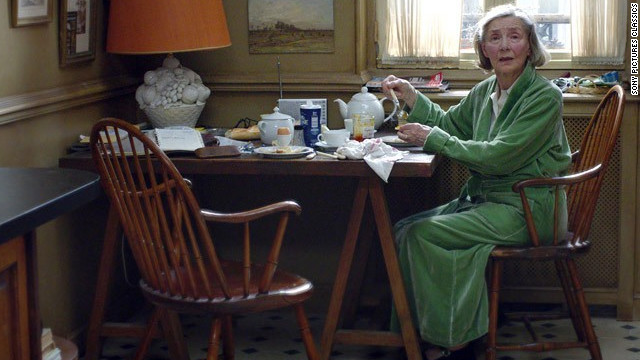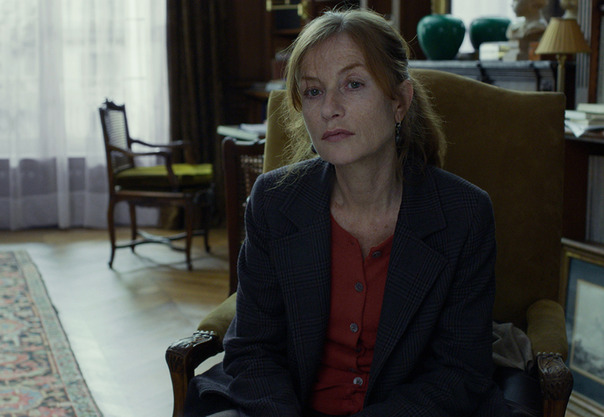There's little surprise in Amour where all of this is going. No more than where any of our lives are ultimately bound. After a silent interval of crisp, white opening credits against a black background - no surprise there, either, from Mr. Haneke - the silence is broken by the crashing open of a Parisian apartment's entry doors. Before we see what is waiting in the sealed bedroom of the apartment, the covering of noses by a few of the attending police officers and firemen, the opening of windows to draw in fresh air to dilute the apparent stench, tells us what is to be found when the bedroom doors are at last prised open. And indeed, there is a body, the supine figure of Anne Laurent (Emmanuelle Riva) on her bed, carefully dressed with a kind of halo of cut daisies about her head. Of course, there's nothing for us to smell, but a quick look reveals that the woman has been dead for some time. No spoiler alerts, then, are necessary with Amour. The point is not what has happened but what a brutal slog it will be to get there.
So, we have Anne and George (Jean-Louis Tringtignant) Laurent, apparent octogenarians, living independently in their Paris flat at the beginning of the long flashback which is Amour. Although Haneke - who as usual wrote his script as well as directing it - will spare us very little of Anne's physical and mental decline, there's really no need to return farther into the past. As the film begins in earnest, this is an elderly couple who have their wits and the use of their bodies, the former music teachers still leading lives of the mind. They might need a bit of help hauling all of those bottles of Evian up to their kitchen, but the couple is not a bad advertisement for attractive old age. Throughout Amour, Haneke injects just enough light to give us a sense of how deep are the dark valleys of this story. We see that Anne and George still have much to lose. And we will be witness to the gradual, torturous loss.
While virtually all of Amour takes place in the darkening world of the Laurent's Paris flat, we do see the couple in the midst of a theater audience early in the story. It's the concert of one of Anne's former students, Alexandre (French pianist Alexandre Tharaud). Some of their post-concert buzz is lost when the couple return to see that someone has tried to break into their home, which is obvious enough from the superficial damage to their front doorway. There's always something after the harried characters in Mr. Haneke's films: intruders in tennis whites, bent on torture (Funny Games); gun-wielding squatters already waiting for a family fleeing to their country home in some sort of post-apocalyptic France (Time of the Wolf); consuming mad love (The Piano Teacher); a spreading poison of violence (The White Ribbon). And one could go on, as has the director. Here, of course, that thing scratching at the Laurent's door is really mortality. Or, scarier still, maybe it's just Michael Haneke.

The apparent late-life idyll of Anne and George does not last long in Amour. The morning after their night out, the couple are conversing at the breakfast table when Anne goes blank, conscious still, but completely unresponsive. George is at a loss. As he's finally gathering himself to summon help, Anne snaps out of it and wonders why her absent-minded husband has left the kitchen tap running. She has no memory of what, or what did not, just transpire.
Anne may want to deny reality at first, but she's diagnosed as having a blocked carotid artery. An attempt to surgically correct the proves unsuccessful, apparently the five percent failure rate claiming a rare victim. Mrs. Laurent finally returns to the couple's flat, where George tries to care for her himself. Having suffered a stroke, Anne is paralyzed along the right side of her body, the right hand that had recently glided along piano keys turned up into a permanent fist. George must help his wife move in and out of her wheelchair. As the elderly husband uses all his strength to lift his wife and move her short distances, as the feet shuffle in unison and an awkward, almost desperate embrace is maintained, we are witness to a very sad dance. There was an indicating piece of music, much used in the film Mademoiselle Chambon, by the obscure Hungarian violinist and composer, Franz von Vecsey. It would apply just as aptly to the Laurents. The composition is entitled “Valse Triste." A very sad waltz indeed we see George and Anne perform on a couple of occasions.
Amour takes us quickly into the descent of Anne, to be followed by her loving husband. The film arrives fairly quickly at this state of affairs, but then takes it's time to document the decline.
As ever with Haneke, the art of Amour is almost unimpeachable; the heart is, as ever, a dark, dark affair. Quite distinct visually from the crystalline black and white photography of the director's previous film, The White Ribbon, Amour's interiors are softly lit and awash in muted color, consistent with the nearly hermetic setting, as well as the film's plot. The cinematography is handled by the veteran Darius Khondji, perhaps the only man to work with both Michael Haneke and Madonna on multiple occasions. The particular camera providing us a perspective into the twilight world of the Laurents is usually static, as with the opening scene in which one is trained on the audience settling in for the piano recital, the doomed Anne and George taking their places just slightly left of center. Only occasionally is there something like a Steadicam movement, gliding around a corner in the apartment at a moment at which George hears the sounds of dishes being washed when there is no one else in the dwelling to be doing that work.
And yet, the art of Michael Haneke is not easily dismissed. Haneke can obviously write a script with more subtlety than other writings might suggest. There are statements in his essays on cinema like, "My films are intended as polemical statements against the American 'barrel down' cinema and its dis-empowerment of the spectator." Such turgid pronouncements might well prepare one for the spirit of his films, but not necessarily the moments of subtlety to be found in some of his stories and scripts.
Beyond the impeccable images of Amour, there is the punishing story rendered with at least a bit more humanity than was the case with the script for his previous film, The White Ribbon. Neither Anne nor George fall towards of extremes of character. The same can be said of the Laurents collectively. While being tended to by George on one occasion, Anne says, "You're a monster sometimes...but very kind." It seems an apt characterization of the husband and captures what seems the emotional tenor of the Laurents in late life, their balance, to borrow a Victorian phrase (and Dennis Potter play title) of brimstone and treacle. If only those words of Anne could be said of the film's director. Alas, I fear she would be only half right.
The considerable art of Amour goes beyond Michael Haneke and his capable cinematrographer, As ever, the director elicits focused, raw work from his actors. The role of George Laurent was apparently written with the distinguished Jean-Louis Trintignant in mind. The actor, perhaps best known to film audiences for starring opposite Anouk Aimee in A Man and a Woman (1966), returned to the screen for the first time in 14 years to star in Amour. He has said of Haneke, "...he has the most complete mastery of the cinematic discipline, from technical aspects like sound and photography to the way he handles actors". All true enough. Trintignant is nearly flawless. The same can be said of the lovely Emmanuelle Riva in what is even a more demanding role. The multiple Oscar nominations tossed the way of Amour is the latest, though particularly extreme example of The Academy practice of trying to find some perceived film of substance, some quite serious film, on which to bestow token recognition, so as to make the award presentation seem something other than the marketing tool and fashion show that it actually is. At the time of the announcement of nominations, one could probably have comfortably seated at one's dining table all of the members of the Academy who and actually seen Amour and valued the experience. But had Ms. Riva actually prevailed as "best actress" for her brave, seamless work in the film, a more fitting recipient could hardly have been singled out.
One of the ways in which Michael Haneke has long distinguished his films from those of Hollywood, with their manufactured sense of catharsis, is in his approach to sound. As with The White Ribbon and previous films, there is no soundtrack in Amour. The only music we hear is that which is played - live or from CD - by characters in the film. As with other aspects of his meticulous craftsmanship, Mr. Haneke goes about this quite expertly. Every sound - the creak of a wheelchair, the sounds of plates being washed in a sink, the thud of a shocking blow being landed on Anne's helpless face - is maximized by the sonic vacuum in which it is created. But beware those purifying cinema revolutionaries who come along every generation or two. Lars von Trier and his Dogma 95 manifesto provide something of a dark kindred spirit to Haneke. But even the notorious von Trier has shown more willingness to occasionally break his own rigid rules and portray a wider range of human experience. Haneke's use of sound and silence is expert. It's also disingenuous. Virtually all the ambient urban sound of Paris is banished from the Laurent's apartment. This in keeping with the couple's seclusion and lonely struggle. It also seems a function of a director who wants all pain amplified to its logical extreme. And then some.
Railing against most of the products of Hollywood, even less than shooting fish in a barrel, is simply poking at a lifeless whale. It doesn't take a particularly brave fisherman. Haneke comes across an Ahab in such regards. But the problem is that this white whale is not swishing dangerously through roiling Pacific waters. It's lolling on a Malibu beach. Massive still, dangerous enough if it's bulk lands upon you. But most anyone who cares to look with clear eyes can see it for what it is. Any such person can come along and fling their harpoon. And what then?
Amour is a very good film. It is, perhaps, a memento mori with whose message we should all acquaint ourselves before the reminder becomes reality. And what then? I suspect Mr. Haneke's answer will be further displays of suffering, torture and the like. Whether this comes in reaction to the universal call of mortality, stupid Hollywood movies, or some more personal darkness, I don't presume to know. Perhaps better, more bravely, one should thoughtfully heed the call of another careworn bit of Latin: carpe diem. That might involve leaving the movie house in favor of living as best we can, while we can. Or at least switching to another auditorium where another director's work is being screened.




Comments
Post a Comment